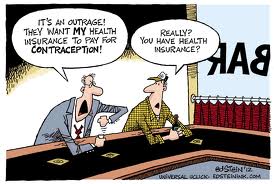Universal health care is good for the rich
As I mentioned in my last post, I’ve been reading T. R. Reid’s book The Healing of America, a look at different health care systems across the world and what the US can learn from them. The basic point of the book is that in every other industrialized country, there is some form of universal health care, which always results in much less total spending on health care and substantially better health outcomes.
Towards the end, Reid compares two hypothetical American women, rich and lower middle class, who are diagnosed with ovarian cancer. He suggests that the US system works fine for the rich woman, who gets diagnosed early, gets surgery costing $55,000, and lives another 40 years, whereas the working-class woman has no insurance, gets diagnosed too late, and dies because she can’t get surgery.
The basic point of his argument, one made often, is that the US system is really bad for the poor and uninsured. This is undoubtedly true. But there’s another argument we should be making, and are not: the US system is also worse than the alternatives for people who are rich or have good health insurance – for just about everyone, in other words.
